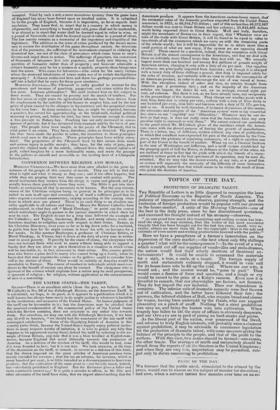CONNEXION BETWEEN RELIGION AND MORALS,
MORNING CiinoNiciv.--We have more than once alluded to the gross ig-
norance of the people of this country of morals. They are left to find out what is right and what is wrong as they can ; and it too often happens, that while they are groping their way they come in contact with justice. The moral instruction they receive from the clergy is vague and general, and ge-
nerally leaves them precisely where they were. The Bible 14 put into their
hands, as containing all that is necessary to be known. But the very circum- stance of the Christian religion being so general in its principles as to be suited to men in all ages and countries, is of itself a sufficient proof that its
rules require a constant commentary, varying according to the varying situa- tions in which men are placed. There is no such thineb as an absolute mo-
rality applicable to all nations and times. Hence the Roman Catholics have endeavoured. in what they call "Moral Theology," to point out the course which individuals ought to pursue in the various situations in which their lot may be cast. The English divines for a long time followed the example of the Catholics; and Taylor Sanderson, Baxter, and many others, wrote vo- luminous treatises to enlighten men with respect to their duties. Baxter, in his Christian Directory, went even so far as to lay down rules for a husband, to guide him how far he might venture to leave his wife on business for a few weeks. in like manner Reyberger, a professor of Christian Ethics, or Moral Theology, in Vienna, lays it down as the duty of every man to endea- vour to avoid poverty. If poverty be the cause of crime, the clergyman who does not instruct those who wish to marry without being able to support a family thtt they are about to place themselves in a situation in which crime will be inevitable, is, in fact, accessary to their crime. The country gentle- man who forces a poor devil to marry who cannot bring up a family, when he hears that that man expiates his crimes on the gallows ought to consider him- self as the abettor of them. What would be suitable in America would be unsuitable in Europe. The course of conduct in individuals which most con- duces to the benefit of society can alone be correct. The clergyman who is ignorant of the science which explains how a nation may be most prosperous, is ignorant of religion ; for religion, without application to the circumstances of men is a non-entity.


















 Previous page
Previous page